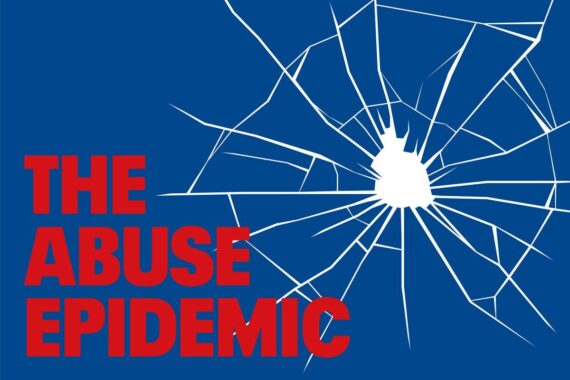Last month two GP registrars at a practice in Sheffield were assaulted by a patient wielding a baseball bat.
Just days earlier, police were called to a practice in Hampshire after anti-vax protesters stormed a Covid vaccination clinic, verbally attacking staff and intimidating patients.
Elsewhere, in Crewe, practice staff had to evacuate patients and fend off a man making death threats while carrying two large knives.
These are not isolated occurrences – three distressing but unrelated and coincidental events. Instead, they are representative of a deeply worrying trend: the general practice abuse epidemic.
Pulse filled an entire cover feature with stories just like these from up and down the country in June, reporting a significant increase in criminal offences at GP surgeries between 2019 and 2022. Data from police forces about incidents in general practice, obtained under the Freedom of Information Act, made for sober reading:
- Public order offences climbed 15%.
- Violent crimes went up by 16%.
- Incidents involving harassment rose by 61%.
- Crimes associated with race or religion soared, going up by 100%.
Of course, nothing can excuse people behaving in such a way, especially towards others who are doing their level best to help. But there is a clear cause and effect at play.
Workload and pressure on GPs are increasing, but so are patient expectations. As one practice manager told Pulse, patients are ‘used to getting an Amazon Prime level of service’ and ‘lash out’ when their doctor can’t provide it. So patient satisfaction levels plummet in response.
Other factors add to the mix, such as the cost-of-living crisis, bottlenecks elsewhere in the health system, and – not insignificantly – the post-Covid media pile-on, which saw sections of the press relentlessly villainising GPs, making them single-handedly responsible for the crisis facing the NHS.
General practice is the ground zero of the resulting nuclear explosion.
In some areas of the country, police authorities and GP leaders have been working together to address the problem.
The BMA has also issued advice for what to do when a patient exhibits frightening behaviour. That includes obvious steps like calling 999 and removing the patient from the practice’s list.
In addition, the BMA said, practices should have a policy for dealing with low-level incidents such as abuse on social media – like keeping records and screenshots as evidence, writing to the patient, involving the LMC or asking for input from a medical defence organisation.
But, as with most of the challenges general practice is facing, what is lacking is any real impetus from the Government to do anything meaningful.
Two years ago, then health secretary Sajid Javid pledged a ‘zero-tolerance campaign’ involving £5m to scale-up practices’ security and a series of posters and social media assets developed by NHS England.
Some ICBs have used the funding on things such as CCTV, glass screens around reception, external security lighting and access systems for internal doors. Others have worked on patient education campaigns, with one LMC chair reporting a reduction in abuse following a social media drive developed jointly with the area’s ICB.
Since then, the Government’s ‘zero-tolerance’ approach has shifted focus, with the emphasis now on improving access and providing more practice support staff.
Indeed, these issues underpinned much of the rhetoric behind the new GP contract that was imposed back in March. Yet, there was no additional support to help with the access measures it mandates.
Even with the best intentions, plans to boost two-week appointments, triaging and signposting, and improve patients’ experience of contacting their practice are futile unless deeper-rooted problems are tackled.
While too few trainee doctors are choosing general practice as a profession, too many experienced ones are walking away from it.
They are no longer willing to be a punching bag, metaphorically or literally.


















Water Cannons
https://www.bing.com/videos/riverview/relatedvideo?&q=Youtrube+no+more+F+to+give&qpvt=Youtrube+no+more+F+to+give&mid=4E4A8F3FDA3F1B09CFCC4E4A8F3FDA3F1B09CFCC&&FORM=VRDGAR
Credit Card ((must be presented to get an appointment and the card-holder is responsible for injury/damage done to the service (will be monetised e.g. the cost of a GP going off with anxiety or PTSD – or worse etc) – just clarifying basic legal obligations…
There is another kind of abuse. Institutional, organised, deliberate abuse. 30+ years in the NHS, the best years of my life working full-time in GP. Going the extra mile, flexing the rules when they prejudice good care, getting home at 8pm too many nights. The abuse I’m talking about could include the bullshit we tolerate from the CQC, the offensive infantilisation we are subjected to through appraisal and revalidation, and last but not least in my case, having to issue a FOI request and then a SAR request to the NHS-BSA to compel them to even tell me how long the wait for my pension calculation will take (15 months and counting). I am lost in a Kafkaesque nightmare which I can’t see an end to and still cannot make proper retirement plans. If I treated a patient with this degree of disrespect I’d be out of a job.
The NHS has failed.
Time to replace it with something that works
Welcome back Kevlar Cardie!